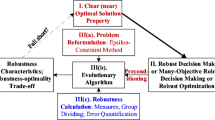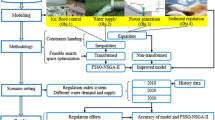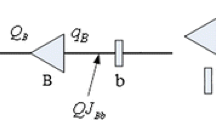Abstract
“Blue growth” emphasizes the sustainable use of marine resources for economic process whereas conserving the health of marine ecosystems. Motivated by this, we focus on the marine reserve design problem under multiple uncertainties, incorporating conservation, economy, reserve area and reserve shape compactness. We develop a novel globalized robust preemptive goal programming model to investigate the problem, where inner-outer uncertainty sets are defined to model the uncertain conservation value and opportunity cost. We thereby derive the tractable globalized robust counterpart of the proposed model and perform the model analysis on the globalized sensitivity parameters. Our proposed optimization framework can be demonstrated for the marine reserve design of West Coast National Marine Park of Qingdao in China. The computational experiments justify several important insights: (i) the resulting reserve area design is more robust than the delimitation of 2014 on the West Coast New Area; (ii) with the change of parameters related to uncertainty sets and global sensitivity, the conservation value can always be realized while the opportunity cost is sensitive; (iii) the comparison results with classic robust optimization method show that the proposed method can reduce the conservatism of decisions and enable planners to formulate more effective policy.





Similar content being viewed by others
References
Abhinav KA, Collu M, Benjaminsb S, Cai H, Hughes A, Jiang B, Jude S, Leithead W, Lin C, Liu HD, Recalde-Camacho L, Serpetti N, Sun K, Wilson B, Yue H, Zhou BZ (2020) Offshore multi-purpose platforms for a Blue Growth: a technological, environmental and socio-economic review. Sci Total Environ 734:138256
Armstrong CW (2007) A note on the ecological-economic modelling of marine reserves in fisheries. Ecol Econ 62:242–250
Bastardie F, Danto J, Rufener MC, van Denderen D, Eigaard OR, Dinesen GE, Nielsen JR (2020) Reducing fisheries impacts on the seafloor: a bio-economic evaluation of policy strategies for improving sustainability in the Baltic Sea. Fish Res 230:105681
Ben-Tal A, Ghaoui LE, Nemirovski A (2009) Robust optimization. Princeton University Press, Princeton
Ben-Tal A, Brekelmans R, den Hertog D, Vial J-Ph (2017) Globalized robust optimization for nonlinear uncertain inequalities. INFORMS J Comput 29(2):350–366
Beyer HL, Dujardin Y, Wattsa ME, Possingham HP (2016) Solving conservation planning problems with integer linear programming. Ecol Model 328:14–22
Boersma PD, Parrish JK (1999) Limiting abuse: marine protected areas, a limited solution. Ecol Econ 31:287–304
Camm JD, Norman SK, Polasky S, Solow AR (2002) Nature reserve site selection to maximize expected species covered. Oper Res 50(6):946–955
Canada (2011) National framework for Canada’s network of marine protected areas. http://publications.gc.ca/site/eng/402066/publication.html
China (2015) National marine functional area planning. http://www.gov.cn/zhengce/xxgk/index.html
Conrad J (1999) The bioeconomics of marine sanctuaries. J Bioecon 1:205–217
Fan XZ, Jia ZR, Dai XY, Sun N, Han F, Lu JL (2019) Ecological quality dynamics around marine reserves in the Bohai Sea coastal zone and their relationship with landscape artificialization. Glob Ecol Conserv 20:e00778
Gaines SD, White C, Carr MH, Palumbi SR (2019) Designing marine reserve networks for both conservation and fisheries management. PNAS 107(43):18286–18293
Gao JW, Chen XW, Yao K, Yang XF (2017) Special issue on computational optimization and intelligence in uncertain environment. J Ambient Intell Human Comput 8:637–639
Li X, Du HJ, Ma HG, Shang CJ (2018) Timetable optimization for single bus line involving fuzzy travel time. Soft Comput 22:6981–6994
NSW (2018) NSW marine estate management strategy 2018–2028. https://www.nsw.gov.au/projects/nsw-infrastructure-strategy-2018-2038
Oyafusoa ZS, Leung PS, Franklin EC (2019) Evaluating bioeconomic tradeoffs of fishing reserves via spatial optimization. Mar Policy 100:163–172
Oyafusoa ZS, Leung PS, Franklin EC (2020) Understanding biological and socioeconomic tradeoffs of marine reserve planning via a flexible integer linear programming approach. Biol Conserv 241:10831
Rasheed AR (2020) Marine protected areas and human well-being—a systematic review and recommendations. Ecosyst Serv 41:101048
Roos E, den Hertog D (2020) Reducing Conservatism in Robust Optimization. INFORMS J Comput 32(4):1109–1127
Shabtay A, Lagabriellea E, Plot V, Potin G, Guyomard D (2020) Marine spatial planning provides a comprehensive framework for building evidence-based shark risk management policies with sea-users. Environ Sci Policy 111:18–26
Hosseini-Motlagh S-M, Samani MRG, Homaei S (2020) Blood supply chain management: robust optimization, disruption risk, and blood group compatibility (a real-life case). J Ambient Intell Human Comput 11:1085–1104
Vaughana D, Agardy T (2020) Marine protected areas and marine spatial planning-allocation of resource use and environmental protection. The Chapter 2 in Marine Protected Areas, pp 13–35
Wang RN, Zhou J, Yi XJ, Pantelous AA (2019) Solving the green-fuzzy vehicle routing problem using a revised hybrid intelligent algorithm. J Ambient Intell Human Comput 10:321–332
Xu EGB, Leung KMY, Morton B, Lee JHW (2015) An integrated environmental risk assessment and management framework for enhancing the sustainability of marine protected areas: the Cape d’Aguilar Marine Reserve case study in Hong Kong. Sci Total Environ 505:269–281
Yaghoubi S, Hosseini-Motlagh S-M, Cheraghi S, Larimi NG (2020) Designing a robust demand-diferentiated platelet supply chain network under disruption and uncertainty. J Ambient Intell Human Comput 11:3231–3258
Zhai J, Yu H (2019) Robust coordination of supply chain with loss aversion. J Ambient Intell Human Comput 10:3693–3707
Funding
Funds for Talent Project of OUC (Grant No. 842012006) and FRF for the Central Universities in OUC (Grant No. 202165010).
Author information
Authors and Affiliations
Corresponding author
Ethics declarations
Conflict of interest.
The authors declare that they have no conflict of interest.
Ethics statement.
This work did not involve any active collection of human data.
Competing interests statement.
The author declares that there is no conflict of interests regarding the publication of this paper.
Additional information
Publisher's Note
Springer Nature remains neutral with regard to jurisdictional claims in published maps and institutional affiliations.
Supplementary Information
Below is the link to the electronic supplementary material.
Rights and permissions
About this article
Cite this article
Jia, R., Gao, J. & Zou, Z. A globalized robust preemptive goal programming method for marine reserve problem with eco-economy tradeoffs and multiple uncertainties. J Ambient Intell Human Comput 14, 13375–13385 (2023). https://doi.org/10.1007/s12652-022-03792-2
Received:
Accepted:
Published:
Issue Date:
DOI: https://doi.org/10.1007/s12652-022-03792-2




